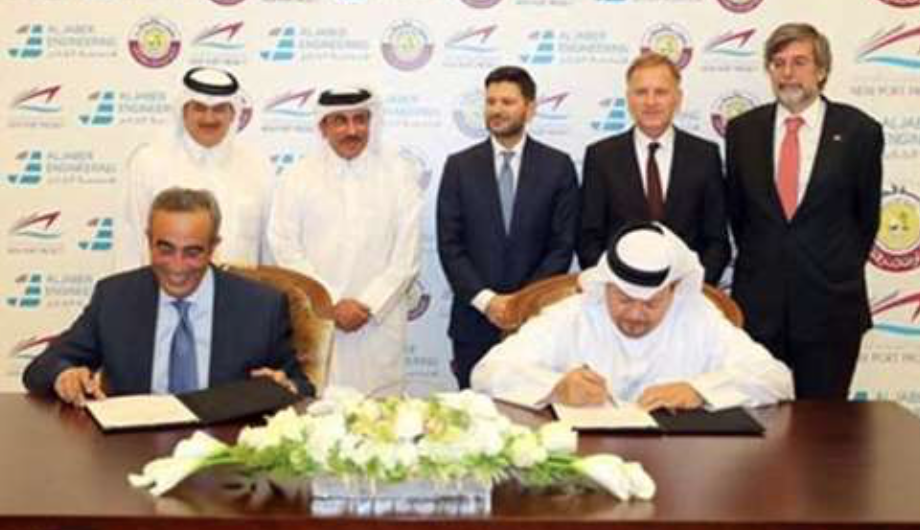
Qatar will build a QR1.6bn food storage and processing facility at Hamad Port capable of supplying stockpile for three main commodities – rice, sugar, and edible oils, for 3mn people for two and a half years, it was announced on Sunday.
HE the Minister of Transport and Communications Jassim Seif Ahmed al-Sulaiti made the announcement after a signing ceremony between the New Port Project (NPP) Steering Committee and Al Jaber Engineering (JEC), the main contractor and designer of the Strategic Food Security Facilities Project.
Al-Sulaiti said the facilities will be built on a 530,000sqm area adjacent to Hamad Port, adding that the project consists of specialised facilities for the processing, manufacturing and refining of rice, raw sugar and edible oils, which “will be available for local, regional and global use”.
He noted that Phase 1 of the Strategic Food Security Facilities Project is expected to be completed in 26 months.
Speaking to reporters on the sidelines of the event, New Port Project executive director Maisar Jamil el-Qutami said the facility will have a daily capacity of 300 metric tonnes of rice, 300mt of raw sugar and 200mt of edible oils.
“The project has the flexibility to add other commodities, and it is capable of producing animal feeds and food stocks from rice and sugar byproduct,” said el-Qutami, who added that the facility could spare 30% of its production for export.
Al-Sulaiti said the project also includes bulk storage silos, including infrastructure and conveyance equipment, as well as structures for handling, processing, packaging, reloading and transport.
The facilities will operate as a fully-functional standalone terminal, while 500m of Hamad Port’s wharf will be dedicated for the berthing and discharging of the ships, the Minister said.
He said German, Italian and Swiss companies like German Ipro, Global Port, Bühler, German BIA and C M Bernardini will be involved in the project.
Al Jaber Engineering CEO Osama Hadid told Gulf Times that companies from the three countries have already submitted their proposals for the supply of equipment and machinery.
“Naturally, the client wants the best quality and we would also want to provide high-quality projects so, we will be co-operating with the best names in the fields of food processing and food storage,” Hadid pointed out.
Al-Sulaiti said the project will be handed over to the Ministry of Economy and Commerce once completed, signalling the start of Phase 2, which will involve private sector companies.
“The private sector will take part in the operational stage, which is Phase 2. The first phase of the project is a strategic one and this will need the capabilities of the state. Bidding for the second phase will start next year to give the private sector time to prepare for the operational stage,” he said.
Al-Sulaiti said the facilities will be built on a 530,000sqm area adjacent to Hamad Port, adding that the project consists of specialised facilities for the processing, manufacturing and refining of rice, raw sugar and edible oils, which “will be available for local, regional and global use”.
He noted that Phase 1 of the Strategic Food Security Facilities Project is expected to be completed in 26 months.
Speaking to reporters on the sidelines of the event, New Port Project executive director Maisar Jamil el-Qutami said the facility will have a daily capacity of 300 metric tonnes of rice, 300mt of raw sugar and 200mt of edible oils.
“The project has the flexibility to add other commodities, and it is capable of producing animal feeds and food stocks from rice and sugar byproduct,” said el-Qutami, who added that the facility could spare 30% of its production for export.
Al-Sulaiti said the project also includes bulk storage silos, including infrastructure and conveyance equipment, as well as structures for handling, processing, packaging, reloading and transport.
The facilities will operate as a fully-functional standalone terminal, while 500m of Hamad Port’s wharf will be dedicated for the berthing and discharging of the ships, the Minister said.
He said German, Italian and Swiss companies like German Ipro, Global Port, Bühler, German BIA and C M Bernardini will be involved in the project.
Al Jaber Engineering CEO Osama Hadid told Gulf Times that companies from the three countries have already submitted their proposals for the supply of equipment and machinery.
“Naturally, the client wants the best quality and we would also want to provide high-quality projects so, we will be co-operating with the best names in the fields of food processing and food storage,” Hadid pointed out.
Al-Sulaiti said the project will be handed over to the Ministry of Economy and Commerce once completed, signalling the start of Phase 2, which will involve private sector companies.
“The private sector will take part in the operational stage, which is Phase 2. The first phase of the project is a strategic one and this will need the capabilities of the state. Bidding for the second phase will start next year to give the private sector time to prepare for the operational stage,” he said.
